Askold's Grave
Askold's Grave (Ukrainian: Аскольдова могила, romanized: Askoldova Mohyla) is a historical park on the steep right bank of the Dnipro River in Kyiv between Mariinskyi Park and the Kyiv Pechersk Lavra complex.
| Askold's Grave | |
|---|---|
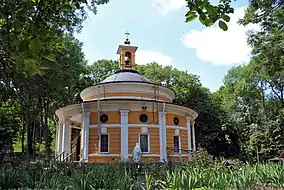 St.Nicholas Church | |
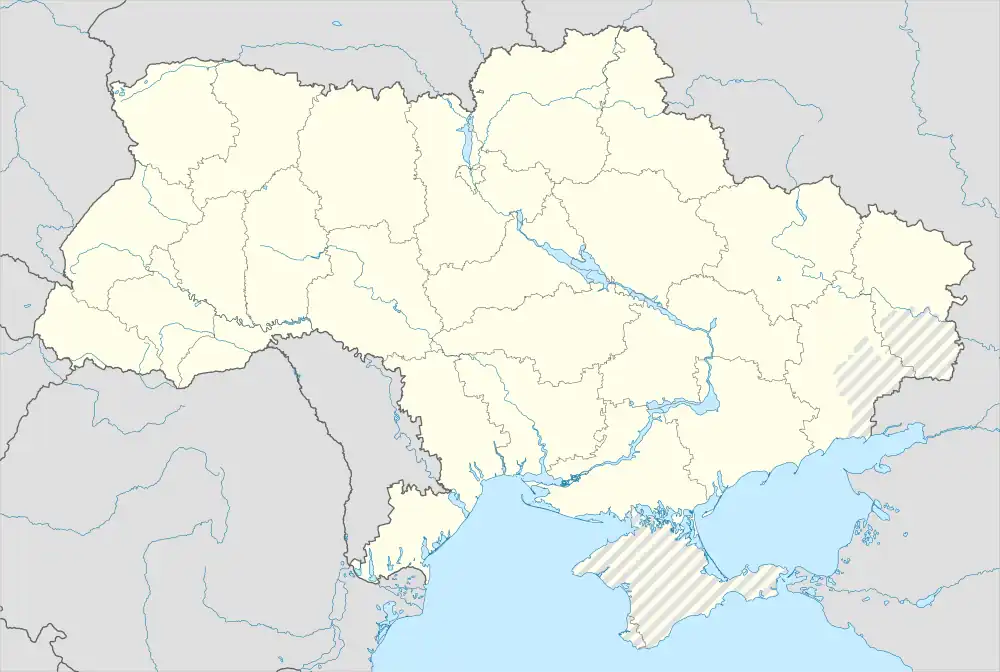 | |
| Location | Kyiv, Ukraine |
| Coordinates | 50°26′38″N 30°33′5″E |
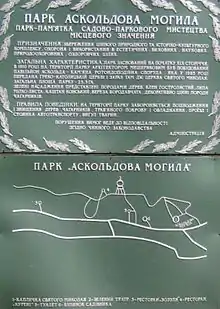
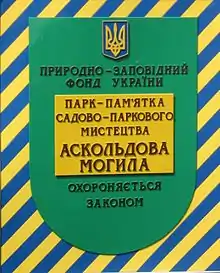
Overview
The park was created by the Soviets in the mid-1930s in place of an old graveyard around the Church of St. Nicholas, which, as the story goes, marks the place where Prince Askold of Kyiv was buried in the 9th century.[1]
In the Middle Ages, Askold's Grave was known as the Hungarian tract (Ukrainian: Угорське урочище, romanized: Uhorske urochyshche). According to the Primary Chronicle, it was the place where the Magyars crossed the Dnipro on the way from the Russian steppes to Pannonia. Archeological excavations have revealed a 9th-century dirham hoard and some remains of Izyaslav II's wooden palace. There's a modern stele commemorating the Magyar migration.
In the 15th and 16th centuries, Askold's Grave was settled by the Orthodox monks of St. Nicholas's Monastery. Hetman Mazepa had the monastery moved to a nearby hill, where a new Baroque penticupolar cathedral was then erected. The existing church of St. Nicholas is a modest Neoclassical rotunda designed by Andrey Melensky in 1810.
A new golden-domed chapel was built on the bank of the Dnipro in 2000. The style is Ukrainian Baroque revival.[2] The chapel is dedicated to Saint Andrew Protokletos and belongs to the Moscow Patriarchate of the Ukrainian Orthodox Church.[3]
Points of interest
- Landmark of Architecture "St. Nicholas Church"
- National Landmark of Archaeology "Uhorske village"
- Chapels: St. Andrew, Exaltation of Cross
- Memorial burial (rebuilt, partially): Memorial to Holodomor victims, Memorial to Heroes of the Battle of Kruty
- Monument to Saint Andrew the First-Called
Lost landmarks
- Priest's House
- Bell tower
- St. Nicholas Hermitage
- Necropolis (original)
Opera
The Opera Askold's grave composed by Russian composer Alexey Verstovsky and premiered in 1835, tells the story of how Askold and Dir happen to be buried in Askold's grave by Olga of Kyiv.
Gallery
 Askold's Grave, a painting of Vasily Shternberg (1837)
Askold's Grave, a painting of Vasily Shternberg (1837)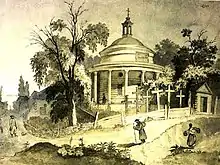 St.Nicholas Church sketch by Taras Shevchenko (1846)
St.Nicholas Church sketch by Taras Shevchenko (1846) St.Nicholas Church (1911, photo)
St.Nicholas Church (1911, photo)%252C_%D0%9F%D0%B0%D1%80%D0%BA%D0%BE%D0%B2%D0%B0_%D0%B4%D0%BE%D1%80%D0%BE%D0%B3%D0%B0.JPG.webp) St.Nicholas Church (2009, photo)
St.Nicholas Church (2009, photo) Chapel of Exaltation of Cross
Chapel of Exaltation of Cross Monument to Saint Andrew the First-Called
Monument to Saint Andrew the First-Called Sculpture of Blessed Virgin Mary
Sculpture of Blessed Virgin Mary Askold's Tomb
Askold's Tomb St.Andrew's Chapel
St.Andrew's Chapel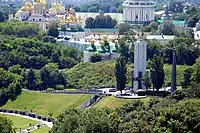 Memorial to Holodomor victims with Kyiv Pechersk Lavra in the background
Memorial to Holodomor victims with Kyiv Pechersk Lavra in the background Heroes of the Battle of Kruty memorial
Heroes of the Battle of Kruty memorial Modern stela commemorating the migration of Magyar tribes
Modern stela commemorating the migration of Magyar tribes Official placard identifying the National Landmark of Archaeology Uhorske village
Official placard identifying the National Landmark of Archaeology Uhorske village Flight of steps down to Dnipro from St. Nicholas Church
Flight of steps down to Dnipro from St. Nicholas Church One of the Park's trails
One of the Park's trails Traffic at the entrance (off Parkova Doroha, 2014)
Traffic at the entrance (off Parkova Doroha, 2014) Winter 2013
Winter 2013